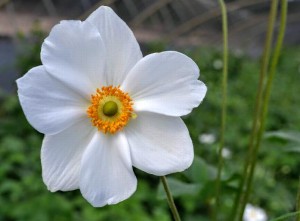 By any measure, Anemone ‘Honorine Jobert’ is a citizen of the world. Descended from several Chinese species and long cultivated in Japan, the plant’s parent was hybridized in England. That English hybrid found its way to France and, once established in the French garden of a man named Jobert, produced a white-flowered sport, or spontaneous genetic mutation. In keeping with horticultural tradition, M. Jobert named it Honorine, after his wife, or possibly, his daughter. Today, this lovely and celebrated multi-national is doing a star turn in my autumn garden.
By any measure, Anemone ‘Honorine Jobert’ is a citizen of the world. Descended from several Chinese species and long cultivated in Japan, the plant’s parent was hybridized in England. That English hybrid found its way to France and, once established in the French garden of a man named Jobert, produced a white-flowered sport, or spontaneous genetic mutation. In keeping with horticultural tradition, M. Jobert named it Honorine, after his wife, or possibly, his daughter. Today, this lovely and celebrated multi-national is doing a star turn in my autumn garden.
‘Honorine Jobert’ was discovered in 1858, just before the American Civil War. It was a time of extravagance in fashion, and women who could afford to do so wore bell-like skirts, supported from underneath by cage crinolines made of concentric steel hoops. Sleeves were wide and exuberantly flounced. We can safely assume that all that fabric and steel made movement slow and cumbersome.
It would have been difficult for any plant to be more over-the-top than a fashionable mid-Victorian woman, but ‘Honorine Jobert’ fit right in. Rising to about three feet on slender but sturdy stems, ‘Honorine’ produces round pinkish-white buds, starting at the end of summer and continuing through fall. Those buds open into pure white, frilly, flowers with double rows of petals that always remind me of a ballerina’s tutu. The petals reach outward from pale green disk-shaped centers surrounded by halos of fluffy golden stamens. The mounding leaves are attractive in their own right,–dark green, with three lobes apiece. A collar of smaller leaves frames each flower.
‘Honorine Jobert’ is a Japanese anemone or windflower, sometimes known botanically as Anemone japonica. A garden stalwart since its discovery, it is part of a group of species and hybrids that have become favorites for late season color and the ability to dance in the wind. Many cultivars bloom in shades of pink or rose, but ‘Honorine’ stands out for its eye-catching white petals.
‘Honorine’ is what my English relatives would call “a good grower”. Great Britain’s Royal Horticultural Society recognized this by bestowing its Award of Garden Merit in 1993, the Chicago Botanic Garden gave it high marks in 2003 after rigorous field trials, and the American Perennial Plant Society made ‘Honorine Jobert’ its “Perennial Plant of the Year” back in 2016. Not bad for a 158 year-old lady.
The plants don’t ask for much and perform well in full sun or light shade. Consistent moisture is nice, but they will carry on if rain is scanty or gardeners are forgetful about watering. They also make excellent cut flowers, even after the petals depart the scene. In fact, some flower arrangers deliberately use only the button-like green seedheads in fall arrangements.
‘Honorine’ has a tendency to self-seed in congenial situations, which some people find annoying. I wouldn’t call it invasive, and neither do most gardeners. If this particular Japanese anemone or any of its fall-blooming relatives become too obstreperous, the offspring are easy to pull out. You can consign them to the compost pile, but ask gardening friends first. Some may appreciate the beautiful fall flowers that will come from your unwanted anemones.
Several sources allege that ‘Honorine’ is not attractive to deer and rabbits. Clearly the deer that frequent my garden have not heard about that and for the last several years have eaten the flower buds off all but a few of my plants. This year their appetites were completely sated by the asters in the back garden and they ignored the anemones. As the result, I have a wonderful display of frilly white blooms.
I will accept good fortune when it appears and remember the deer spray next season.
‘Honorine’ and her fall-blooming relatives will also work in containers, but I would grow them in one-gallon nursery pots and drop them into larger, decorative containers when the flower buds appear. This “drop in, drop out” method ensures that you always have fresh, seasonal blooms and foliage in your display containers.
Hoop skirts are long gone from the fashion scene—and deservedly so—but ‘Honorine Jobert’ goes on and on. You can sometimes find plants on sale at nurseries now, or order for spring delivery from Bluestone Perennials, 7211 Middle Ridge Rd. Madison, OH 44057; (800)852-5243; www.bluestoneperennials.com.
